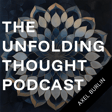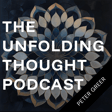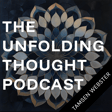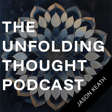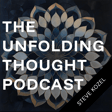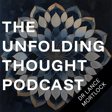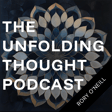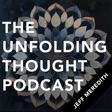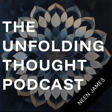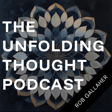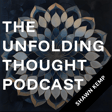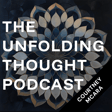Introduction and Challenges in American Democracy
00:00:02
Speaker
Welcome to the Unfolding Thought Podcast. My name is Eric Pradham. Today, I'm talking to Shannon Watson, Executive Director of Majority in the Middle, an organization dedicated to bridging political divides and promoting effective governance through relationship building and practical cooperation.
00:00:22
Speaker
Shannon and I discussed the challenges facing American democracy today, from the erosion of bipartisan cooperation to the societal impact of declining trust.
00:00:34
Speaker
We get into how political polarization is reshaping community dynamics, the importance of local engagement, and steps each of us can take to rebuild trust and effective governance at all levels.
00:00:50
Speaker
Shannon's insight is rooted in her extensive experience and her passion for pragmatic solutions. Our conversation gave me a little more hope for our future, and I hope you will get some of the inspiration I did from Shannon.
00:01:08
Speaker
And now I bring you Shannon Watson. Shannon, thank you for joining me. Would you mind telling me a little bit about yourself?
Shannon Watson's Background and Role
00:01:16
Speaker
Absolutely, Eric. Thanks so much for having me. um So let's see. I currently live in Minnesota.
00:01:22
Speaker
um I say I'm a Minnesotan by choice. I am a born and bred Kansan. um So, you know, very, yeah very attuned to the Midwest. I i spent some time in Kansas, some time in Colorado, and then some time in Minnesota, where I've been for the last 15 years.
00:01:38
Speaker
um I am currently the executive director of an organization called Majority in the Middle, and I'm sure we'll talk more about that. And, um, let's see what else about me. I am the oldest of three girls and, and man, I check all of the, you know, the psychological boxes of oldest child, you know, I got to try out all the rules and I'm the, you know, the rule follower and ah You know, a lot of approval through achievement kind of kind of psychological profile.
Goals and Efforts of Majority in the Middle
00:02:06
Speaker
um And I have a dog named CJ who is extremely spoiled. i And yeah, that that's me. So ah Majority in the Middle, it's a 501c3 nonprofit. um if if you know Some people know and care about the difference of the different Cs.
00:02:26
Speaker
um They're really all just tax statuses, but sometimes they tell you a little bit about the organization. um But we are working on um overcoming political polarization. um Now, whether or not that's actually an achievable goal is debatable, um but it's probably the easiest way to explain what we're what we're trying to do.
00:02:43
Speaker
um We have three sort of focus areas. The first one is being a space for people who um are feel like they're in the political middle and they kind of want to engage, but they don't feel comfortable ah on on one side or the other.
00:02:59
Speaker
um We have people, ah one of the one of the main questions that people ask us is, well, what do you mean by the middle? How do I know if I'm in the middle? And we generally let people sort of self-define that um for themselves.
00:03:14
Speaker
ah They self-identify. So for some people, that means that they, you know, they say that, oh well, I'm on the right or I'm on the left, but I'm kind of moderate. So they think of themselves as the middle.
00:03:25
Speaker
There are some people, ah full disclosure, like myself, who hold some positions that are generally on the party platform for the right and some that are on the left. ah And so I used to say that I'm on nobody's team and now I say I'm on everybody's team. i So that and that puts me in the middle because I'm not 100 percent on either side of that fence.
00:03:44
Speaker
um And then there are people, and this was really surprising to me, there are people who ah believe in in what we're doing and participate. ah They sort of very stringent in their ideas, right?
00:03:57
Speaker
And left, um these are these are my beliefs, these are my values, these are you know how I see the world. But they understand that governing, not necessarily campaigning, but governing...
00:04:09
Speaker
um is something that we sort of have to do in the middle. That's where the compromise and the collaboration happens. um And so, you know, so that's sort of the the third middle people who really in ah any other context wouldn't really identify as as part
Promoting Bipartisan Cooperation
00:04:22
Speaker
of the middle. But, you know, our our door is open to anybody who wants to sort of come in good faith.
00:04:27
Speaker
um So that's first thing, and you know, kind of creating that space. um Sometimes that's a metaphorical space. Sometimes it's a physical space. The second thing we do is we try to elevate the behavior that we want to see.
00:04:41
Speaker
And this is primarily from elected officials, but from, you know, quote unquote, normal people as well. That's, you know, legislators that are working across the aisle or people who are in bridging work who are just kind of modeling the behavior we want to see.
00:04:58
Speaker
A ah reality of human beings is what is rewarded is what will continue. And so particularly with elected officials um who are now having to live in this attention economy, um we feel like if they are just getting attention,
00:05:17
Speaker
for the really divisive things that they're doing, those are, you know, they're being incentivized to do that. And those things will continue. So um we try to do kind of the opposite. We don't, like, I don't walk around the state capitol in Minnesota telling people, hey, can you please not be so partisan? Like, can you try to get along?
00:05:33
Speaker
Like, Number one, nobody's going to take a meeting. That's not fun. It's not going to change anybody's behavior. But what I can do instead is um I've got some PR background is point to the people who are doing it right.
00:05:45
Speaker
You know, I almost never ask journalists to do a story on majority in the middle as organization. But what I can do is say, hey, Minnesota Star Tribune,
00:05:57
Speaker
These two legislators over here are working across the aisle on something that's really it's not making headlines, but but it's interesting. And they're you know, they're working together on it. Can you do a story about that? Because we want that to be upheld as something good.
00:06:11
Speaker
um And so that's that's what we do. Try to encourage people's good behavior by ah by by giving them acknowledgement um and encouragement into that. A friend of mine ah said that I ah do, i don't I don't have kids, but he said that I apply gentle parenting to legislators.
Structural Changes to Reduce Polarization
00:06:32
Speaker
um Okay. And then so the third thing, ah Bucket, that we do um is we work on ah sort of structural and... um structural and ah sort of infrastructure type things, rules, customs, behaviors, ah to try to make our society not quite so politically polarized.
00:06:55
Speaker
um One example of this is sometimes, you know, when you and it it differs from state to state.
00:07:07
Speaker
um It differs in Congress. We we spend very little time on Congress because like that's that's that's like my 15 year plan. Like, let's let's fix the states first and then we'll then we'll look at D.C. um But sometimes when you when you go into a room and it's like all the Republicans sitting on one side of the table and all the Democrats sitting on the other side of the table and you walk in the room and it feels kind of antagonistic.
00:07:27
Speaker
That's partially because it's designed to because you have this, you know, you're over here and you're over here. And so it's in it's sort of opposition. What what happens if you mix it up?
00:07:40
Speaker
You know, sometimes like it's it seems silly to pay attention to like where people's chairs are. But at the same time, if being in sort of close physical proximity to people, um if that allows you to build that that building block of relationships, then sometimes those things can help.
00:07:58
Speaker
so So we look at at those issues as well. I am nowhere near as experienced in this area or and as informed as i believe you are.
00:08:10
Speaker
So please correct me if I'm wrong here. But While politics and culture and we can describe high level aspects of the United States or the world, and we can attribute, you know, we can assign different words to them, but just really being broad, while politics has changed over centuries,
00:08:36
Speaker
you know, in the United States. I believe that one sort of key turning point that a lot of people point to at, I guess, the national level, but I believe it's had an impact at the state and state level perhaps, is in the 90s, if I recall correctly,
00:09:01
Speaker
Newt Gingrich advocated for um representatives to not live in Washington, D.C., and instead to go home for the weekends.
00:09:12
Speaker
And I believe that a number of people have pointed to this as a time when reaching across the aisle, so to speak, started to break down because you didn't have some socializing or playing on the, I don't know, congressional softball team or something like that occurring.
00:09:32
Speaker
and whether that's the right instance to pick on or not, I do feel like i have heard that there have been these key milestones perhaps in recent decades where after that point, something changed or it has become harder.
00:09:54
Speaker
for people, our legislators to work together. And do you feel like that has changed over time, whether because of media or because of specific decisions, it has actually become that the Republicans and the Democrats or whoever are sitting on opposite sides of the table or opposite sides of the room and have a lack of willingness or ability to work together just more and more over time.
Social Media's Impact on Legislative Cooperation
00:10:29
Speaker
ah do That's a great question. um i I do think that the the biggest challenge that we have is when um when the only time that legislators see their colleagues on the other side of the aisle, it is an like a committee hearing or a floor session or social media, whatever, because those are very performative spaces.
00:10:57
Speaker
You know, that's where they have to go and say their piece or ask their, you know, their their probing question of somebody and make a point and and do the thing. Yeah.
00:11:10
Speaker
Most people who who, at least in my experience, most people who serve an elected office, ah they know when the camera is pointed at them and they have the things that they have to say.
00:11:22
Speaker
um And that's often usually not out of a response to the ah opponents, but it's more in a in response to their supporters.
00:11:36
Speaker
and the people that they see as their constituency. um Because your friends are often way meaner than your enemies are. um And so when when people feel like, you know, okay, well, I have to be on the record supporting this, or I have to use this phrase, um that's generally a a nod to their base constituency.
00:11:59
Speaker
um And so if that is the only experience you have of a colleague, You sort of get the idea that that's who this person is. But that's really sort of the most extreme social media-ish version of that person. That's not, you know, the the person who's having a turkey sandwich for lunch and as, you know, benign as that could be.
00:12:24
Speaker
um We talk a lot about i how it's it's hard to hate up close. And so the more that ah people can can find those so silly, like, just bland, personal, you know, things that are similar.
00:12:46
Speaker
um those Those are really the building blocks of relationships. It's not, hey, I agree on this policy and let's work on this policy together. It's, do you see each other as as human beings?
00:12:59
Speaker
Do you see each other as, you know, Eric and Shannon, not Representative and center, you know, those those kind of things. um So.
00:13:11
Speaker
So one of the things that we ah talk about is how can people interact with cameras off and like in Minnesota, the the legislators each have offices, but they are um they're separated by wings and floors by parties.
00:13:30
Speaker
Which means, you know, the only time they see each other is in committee or on the floor. They don't always use the same elevator. They don't stand in the same line in the lunchroom, you know, when everybody's, like, microwaving their lunch.
00:13:47
Speaker
they They don't have those little things, you know. Um... You know, if you the people that you sort of share space with and whether that is in an academic setting or in your workplace, the people you share space with. And this this may be some of the, you know, why it's so important that that ah companies feel like they're calling their people back to work and they talk about collaboration. But like that doesn't really hit the mark.
00:14:11
Speaker
I think what they're really going for and what we're sort of trying to encourage in legislators is um just getting to know the person to person and having the little snippets of conversation. um Like if you work in an office and somebody gets a flower delivery, something really good or really bad has happened.
00:14:33
Speaker
You will learn that about somebody. If you can see somebody's desk and the pictures that they have hanging on the wall, you might see the picture of them with the giant fish. Maybe you also like to fish.
00:14:45
Speaker
That is a sense of common... That is something you could talk about that has nothing to do with politics, that is that building block of relationships. um And so I think those those are as To go back to your original question, um when people aren't encouraged to spend more sort of off-camera time together, and they're you know like go back into the district, which there is some benefit to that. you know You do have more contact with your constituents, but you have less contact with your colleagues.
00:15:19
Speaker
And that's and i I think you're right. I think that's where um some of that extra polarization sort of sits in because you just you don't know those people as well. It has been a long time since I've thought about this particular research, but you're reminding me of research that I believe was done by Robert Putnam around, I think it was in the early 2000s. I will link to it in the show notes, but if I recall correctly, they found in their research that the the most
00:15:57
Speaker
heterogeneous communities were actually the communities where there were the lowest levels of trust. And Robert Putnam spent years before he and his collaborators published this research because he felt like the gut reaction to it would be see diversity has failed.
00:16:19
Speaker
And so they did a lot of research to find out why is it that when you have a diverse community on average, the levels of trust that people would state when asked, do you trust your neighbor, essentially, was half of what it was in the most homogenous communities.
00:16:40
Speaker
And what they found after doing a lot of research was that just being around someone who is different, but not actually interacting with them and coming to feel like you are a part of something together, just further cemented whatever it was that you thought about that label or this label or whatever.
00:17:03
Speaker
And so if I have someone who's very different from me, whether it's in appearance or accent or who knows what that lives right
Building Trust in Diverse Communities
00:17:10
Speaker
next door, Whether we talk or not, if I don't feel like we are a part of this neighborhood or we are a part of this state or something together, then i am very likely to continue to feel however I felt about that label that I apply to them.
00:17:32
Speaker
And you're reminding me of this because it's not just, I think, I would love for you to to correct me or give me your take.
00:17:43
Speaker
But as I understand it, it's not just about being around the person, right? Having your office next to them as much as it is that when you walk down to the lunchroom or whatever,
00:17:57
Speaker
you see something about them or you hear them say something and you are able to then see them as being a person just like you that happens to have concerns, maybe just like you, or they're interested in fishing or whatever, despite the fact that they're on the other side of the aisle or despite the fact that they are female and I am male.
00:18:26
Speaker
Right. Or they're from another country or or they have a different sort of socioeconomic status. um Yet the the human um the human instinct to form in groups and out groups is enormous. I mean, this is like part of our evolution. This is in like the reptilian part of our brain.
00:18:46
Speaker
um And it comes from, ah ah you know, like caveman times where different... could have meant dangerous. um So we naturally gravitate towards people who are like us. And that's one of the reasons that when we experience somebody who is different, our brains try to find things that are similar. And if you don't have that opportunity, if you just, to your point, like if you have a neighbor who is different than you,
00:19:17
Speaker
And you never talk to them. Not only are you not finding the having the opportunity to find those commonalities, but you also have this really weird, like awkward kind of I i don't talk to you. I'm around you, but I don't talk to you. You must not like me. You must, you know, we we never think like and and I live in Minnesota and that has the so a reputation for, you know, Minnesota nice, which is the people in Minnesota will give you directions to any place with their own house.
00:19:45
Speaker
um which I actually haven't, I'm kind of torn. I haven't had the experience, but I also am kind of an introvert. And so when people say, yes, you know, let's have plans. We'll we'll make some plans and we'll have dinner someday soon. And then we never do.
00:20:00
Speaker
um i yeah There are four girls who I went to high school with in Kansas who have also, we also live in the Twin Cities. ah We have never gotten together. Actually, I think a couple of them have gotten together independently, but I've never gotten together with them. And these are people like I went to school with and I have known One since like first grade.
00:20:17
Speaker
So so it's just it's it's sort of a culture thing. But, you know, a lot of people are just like what? Like I'm going to have a neighbor right next door who I don't talk to. I don't I don't ever think, you know, oh, I don't have a relationship with that person because I'm the awkward one or I'm the secretive one or I'm the you know, I'm the unfriendly one.
00:20:36
Speaker
It's to your point is, oh, it's that stereotype is exactly what I've heard. And yes, though that person is unfriendly or secretive or or whatever. What are some of the strategies or the exercises, I guess, that you go through in order to bridge some of the gaps and foster sort of a genuine or productive dialogue between people who might be on opposite sides of issues?
00:21:09
Speaker
That's a good question. One of the things that um I mean, other than like I have a lot of individual conversations um with legislators ah and mentioning like, you know, if I'm talking to somebody about an issue that they're working on or whatever.
00:21:25
Speaker
Sometimes I say, hey have you talked to other person so-and-s so and so? They were working on something similar or or whatever. And to sort of, you know, so that here's some information that you may not have had because you don't necessarily have a super tight relationship with this person.
00:21:41
Speaker
And if you want to act on it, great. um One of the things that we do organizationally ah is what we call our state of bipartisanship report.
Hidden Bipartisan Efforts and Public Perception
00:21:50
Speaker
And this this report, this will be the third year that we've done it.
00:21:55
Speaker
um The first year, i it started it started out as it it started as something completely different and it turned into this thing. ah We were trying to answer the question because there's this ah there's this sort of it's not really a myth. It's just like this belief ah in Minnesota ah that if you're a member of the minority party, you can't even get your bill heard.
00:22:19
Speaker
Like, that's a thing. In some states, ah there's a limit on the number of bills that ah can be introduced and they all get committee hearings, like no matter what. In Minnesota, that's not the case.
00:22:31
Speaker
ah So. and So there was just this belief. And so a a new lobbyist asked me the question in early 2023, said, hey, is this is this actually true?
00:22:43
Speaker
And I said, well, i I don't really know. Like, I've known people who are in the minority party who have been able to get laws enacted, but I don't know if it's, you know, statistically significant or if those are just one-offs or what the deal is.
00:22:58
Speaker
um So we started counting just the bills that were getting hearings. Like, who is the chief author? are they report reference Are they Republican or Democrat? Just trying to keep an accounting. And 2023, there was an enormous amount of legislation that that was going through. So this was actually a terrible year to start this project because the way we were doing it, we had to do it all by hand. And I mean, there was something like...
00:23:22
Speaker
I want to say 3,700 bills got individual committee here. I have the I the mother of all Excel spreadsheets doing this, because what we figured out really quickly was um that just who the lead sponsor is of a bill, Republican or Democrat, that doesn't actually tell the entire story, because you can have you can have a whole bunch of legislators who sign on to a bill and who the lead There's usually some strategy behind that, either, you know, depending on the district or if they are in leadership or if they are sitting on a particular committee, whatever. Like there's a there's a lot of sort of stuff that goes into that.
00:23:59
Speaker
So we went back and instead of just looking at, you know, who the chief author is, the red versus blue, you know, like, OK, what's the total authorship of this bill when it got a hearing? And what we found after we like sort of put all this stuff together was that if you if you look at the red versus blue story, you you have sort of an outcome of a story to tell.
00:24:23
Speaker
But when we incorporated all of the authors, we had the red, we had the blue, but then we also had this huge swath of purple in the middle. And Minnesota, over the last 10 years or so, has had a ah sort of a love affair with omnibus bills, which are each committee puts together one giant bill of all the bills. And those, honestly, usually pass...
00:24:50
Speaker
a or fail on party lines um because because all the good stuff is thrown in, all the bad stuff is thrown in with the good stuff, you know, depending, bad or good, depending on which side of the aisle you're sitting on.
00:25:02
Speaker
um The majority party will generally load up their good stuff that they that they want to, um Sometimes they put some stuff that the minority party would want in there to try to get the minority party to vote for it.
00:25:14
Speaker
That very rarely doesn't work because to vote for, you know, your little good pieces, you'd have to vote for the other things that you think of as sort of poison pills. so So when you get done at the end of the session, we'll have 20 bills that have passed.
00:25:29
Speaker
They will all be party line votes. It seems like it's, you know, everybody hates each other. Everything is a party line vote. there's There's no collaboration. there's There's none of that. um But what we saw was in again, in the building blocks...
00:25:44
Speaker
of the work um was was this huge number of people who were working together. And so we called that the hidden bipartisanship that was happening. It was people who were working together on issues.
00:25:56
Speaker
um They didn't always get enacted. They didn't always get through. Sometimes they wound up in the on-goes bill. Sometimes they didn't. um But we thought that, like, I was surprised, and I look for this kind of thing, but I was surprised to see it So we figured, like, this is a really important story to tell, that there's all of this work going on. Because being in the middle and, like, working across the aisle, the the biggest opposition to working across the aisle usually does not come from the other side of the aisle. It comes from within your own caucus.
00:26:28
Speaker
um I didn't know this. Like, i've I've never held an election certificate, but I talked to a whole lot of people. current and former legislators when I was putting this organization together. And I was just like, okay, what is your experience? What can we do? What is, you know, what is sort of the core root of some of these, these things? And, and they were telling me about, about, you know, their kind of horrible experience.
00:26:50
Speaker
Because again, your friends are way meaner than your enemies are. ah Horrible experience trying to work across the aisle because they were getting pushback from, from their friends. um And so that can be really sort of lonely place to be and something that, you know, like, don't know if I want to try to do that.
00:27:09
Speaker
But it's real, there was a lot of it happening. And so people were a little little more ah willing to sort of step out and step into working together um because they realized I'm not the only one that's trying to do it.
00:27:24
Speaker
So you promote this or you... publicize it. You know, you make it known through what was it called? The bipartisan state of bipartisanship report.
00:27:36
Speaker
Yes. um Which is on our website. I'm working on the 2025 version now. um we're We're going to publish it before the end of the month. um And yeah, and so we have a, a, an accounting of all the bills that got hearings.
00:27:52
Speaker
And that's whether these bills became law or not. um Because think the, you know, the process, that you can't, you can't enact everything. um And, and it's, it's in doing the work that we, that we get.
00:28:06
Speaker
good policy and like, you know, you can't get good policy unless you you have good work um sort of in the the formative parts. um And so we we publish that. We publish, um you know, ah and sort of a page for each committee.
00:28:21
Speaker
Like here's here's sort of what to do. And that comes from Committee chairs have an enormous amount of authority when it comes to what happens in their committee. They have ah almost yeah universal um control over what bills get heard.
00:28:38
Speaker
um And so individual legislators each have a page and, you know, how likely are they to sign on to a bill that's, you know, just of their own party or that it's authored by a colleague or co-sign a bill that's authored by a colleague, welcome other people onto their bills.
00:28:54
Speaker
um so So, yeah, it's what We wanted to answer a yes or no question and we wound up with 300-page report.
00:29:04
Speaker
And I think if I'm understanding some of what you said earlier, as well as what seems to me like the rational next step, I guess, from this report is that a part of your work is trying to make various groups, whether it's the public, voters, legislators themselves, aware of all of the bipartisanship, all of the issues that are
00:29:41
Speaker
middle of the road issues. i may That may not be the best phrasing, but, you know, I think it's easy to see the tweet or the headline or whatever that you know, the sound bites get the attention, right? And that's usually the very biting, critical stuff.
00:29:56
Speaker
And it sounds to me like you're trying to let people know there's all this work that and all this collaboration that is actually occurring and look at the good that's coming out of it. That's part of what you're doing.
00:30:08
Speaker
Yes. And um like just just letting people know it happened it's happening, because if you ask most voters, you know, normal American citizen voters, um they will say and they do say because I had the legislators tell me, like I go to the door and and I hear door after door after door.
00:30:28
Speaker
Can't you guys just get along? Can't you figure it out? And that's partially because the rest of us have to figure it out. You know, this is ah the only job. where I mean, think about it. Like if you went to work and kind of hated on half of your coworkers just because of which department that they that they were in. I mean, you know, nobody goes to work is like, okay, well, accounting outnumbers the marketing people. So the accounting people are are in charge of everything.
00:30:59
Speaker
And the marketing people are just going to kind of try to throw sand in the gears and talk about how terrible the accounting people are. Somebody's going to send a tweet about how what Andy from accounting is such a terrible human being. i Like, normal people, do we do not get to do this.
00:31:15
Speaker
Whether we want to or not, we we do not get to do this. And, you know, our elected leader representatives, this is seen as okay.
00:31:26
Speaker
Like, it's kind of nonsensical when you think about it. um And I think it's one of the reasons that average people get so frustrated with legislators and legislative bodies at
Public Frustration and Bipartisan Success Stories
00:31:39
Speaker
Congress. Like, like, why can't you guys just figure it out? Everybody else has to figure it like, like this just gridlock doesn't, it doesn't work.
00:31:48
Speaker
um So I think part of it is letting people know that even though all the social media you see and all the the traditional media you see is, is about the fight is about the conflict and Oh, there's a lot of work that's happening. That's exactly what you want to happen.
00:32:08
Speaker
It just doesn't get the headlines. And so um the other thing that we try to do is like we we very purposely don't do a scorecard like every every legislator in Minnesota has an individual page and we sort of report on their activities.
00:32:25
Speaker
Bill authorship is it's like that's the deliverable of being a legislator is is enacting laws and working on laws like that's their job. um And this is just a small piece of sort of overall bipartisanship because bipartisanship is kind of a fuzzy concept.
00:32:44
Speaker
It's highly relationship based. It's very, so you know, very objective, um subjective and. so So this is just this is one thing that can be counted, um which was important to me because, you know, the organization that I represent was very young at the time. And so we were like, OK, we need something that is absolutely objective and absolutely defendable that we could, you know, come up with um if we were going to say, well, here's what's here's what's going on. But we acknowledge it's just a little piece.
00:33:15
Speaker
little You could have somebody who looks like the most bipartisan person on the thing, and they could be, like, a terrible human being to interact with. Like, that occasionally happens.
00:33:26
Speaker
um Or vice versa. You could have somebody who is is super collegial, and it just sort of doesn't show up in the numbers. I mean, that happens. But one of the things that we want to do is let average people who have tuned out, because they're like, all these people do is fight.
00:33:42
Speaker
i don't and like I don't want to be part of that. like You know, I want to buy my groceries and take my kids to soccer and watch my TV show and, you know, go to work and live my life.
00:33:53
Speaker
I don't need all that negativity. um Let them know it isn't necessarily all negativity and remind them that if you do want your legislators to, and that's city council or state or Congress or whatever, like if you want your elected representatives to work together and cross the divide and figure this out, you kind of need to tell them that because usually only hear from people that who want them to do stuff.
00:34:24
Speaker
And that's either, we want you to, you know, advance this agenda, or we want you to stop the advancement of this agenda. You know, those are the people that they hear from. They don't hear from the vast majority of Americans who just want them to get along.
00:34:38
Speaker
and And so sometimes letting letting the normal people know that there is some of that. You're you're not seeing it on TV. There is some of that, you know. It seems to me that when i believe that all that the politicians are doing is bickering or they can't get anything done or it's all negative in one way or another, that that drives me, whether I'm on the left, right, or center of an issue, let's just make it super simple.
00:35:19
Speaker
I'm on one side. I'm all on one team. And it just drives me away from any ability to believe in collaboration and also perhaps suppresses any potential future participation, such as voting, for example.
00:35:39
Speaker
And so the easier we make it, the more that we promote stories or headlines um that are the sound bites or the tweets, so to speak, the more, the less people are involved in the process at the end of the day, because the vast majority of people who I believe do hold shared opinions and values, they just don't realize it because they don't use the same terminology um or because they've never talked or they don't realize it for any number of reasons.
00:36:17
Speaker
The vast majority of people have just stepped out and 10% of the people are left. And those are the people who are willing to put up with the arguments or the the lack of collaboration.
00:36:32
Speaker
And I think that's that's implied, but also you got really close to saying that this is kind of what happens, right? Is people get driven out of participating. Absolutely.
00:36:43
Speaker
um So there's a couple of pieces. The first one is you mentioned, um you know, people opting out of voting. People are also opting out of running for office and participating.
00:36:56
Speaker
um And I mean, like, think about the best person, you know, like just the best person, you know, and what would happen if you suggested that that person run for office?
00:37:09
Speaker
Like the most of the best people I know, i suggest you should really run for office. They laugh at me and they say, no no no no, no, no, no way. No way do I want any part of that.
00:37:20
Speaker
um So I think the you've you've acknowledged the sort of the 10 percent that are kind of participating They're the 10% that both put up with the the current sort of situation.
00:37:36
Speaker
And um they're kind of the loudest 10%. um Majority in the middle in our name comes from my sort of acknowledgement. Like, I don't believe that we are actually like, you know,
00:37:51
Speaker
yeah We talk about how, you know, we're we're so the whole country is super polarized. We've never been further apart than the Civil War or, you know, whatever. um I don't necessarily believe that we're actually that much further apart.
00:38:05
Speaker
I believe you've got people on side A and you got the people on side B. And in the middle, you have this chasm of the people who dropped out like I don't want any of that.
00:38:18
Speaker
the i first debate between then-President Trump and then-candidate Biden in twenty September 2020. We were, like,
00:38:32
Speaker
you know I didn't watch that debate. and didn't need to. It wasn't going to change my vote. um And actually, I think I had a meeting that same evening. But anyways, I didn't i didn't watch the debate, but I remember watching social media afterwards.
00:38:45
Speaker
And there were some things that I saw that I expected, like the people on the right doubling down on how terrible Joe Biden was and the people on the left doubling down on how terrible Donald Trump was.
00:39:02
Speaker
And of course, it it shouldn't surprise me. Like it wasn't, our side is so great. It was, your side is so bad. You know, but that's that's sort of what we're but we left with right now.
00:39:15
Speaker
And so I saw like a lot of that I expected and like, okay, this is this is what I see. The thing that I saw that I did not expect was was people who I consider to be very political people. They either, you know, have served in office themselves.
00:39:31
Speaker
They have been legislative staff or or agency staff, people who've worked on campaigns, people who, you know, are are um active in their sort of local party apparatus units.
00:39:46
Speaker
um Very politically driven and connected people. I saw a whole mess of them, both from the right and the left, say, ah this is nu it's like this is gross. This is too much.
00:40:02
Speaker
I'm out. And they were joining that majority in the middle of people who were throwing up their hands and saying, I can't. I'm out. And that to me was a tipping point, was if we are driving out even these people, who probably border on your 10% of people who could you could deal with it, if we are driving out even these people, we got to figure something out.
00:40:28
Speaker
And so I was like, I don't necessarily know how to fix this. I've got some inklings. um But what I did know was the how to convene and how to put a brand around something. And so it was like, all right, here, going to have an organization and we're going to figure this out.
00:40:44
Speaker
I came upon somewhere, maybe it was your LinkedIn profile or it could have been your website, the statement, the relationships are the work. Yes.
00:40:55
Speaker
And as you're talking, it's become very clear to me what you mean by that, because I read a little bit into it.
00:41:06
Speaker
thought, well, you're probably saying this, but we talked maybe 10 minutes ago about actually getting to know people and finding commonality and all that. But, and I think even and some of the last things that you said, you know, like it, you don't have a relationship in many senses of the word with someone. and If you don't talk to them, you know, you can have a relationship in the sense of there's a relationship in your mind with that person who's different from you in one way or another.
00:41:40
Speaker
but not in the way that we typically mean it. And I think some of what you've been saying is the work to get to being able to be bipartisan, for example, is the relationship. That's the work that you have to do.
00:41:57
Speaker
Is that correct? that's that's it That's a good analysis. um I love it. ah So the the origins of the relationship of the work is... ah ah mission I mentioned I'm kind an introvert, you know, by birth.
00:42:11
Speaker
um But I also I have one of my undergrad took me 11 years start to finish. um It took me a very long time, partially because I didn't know what I wanted to do with my life. I still don't know. I'm 50 years old. I don't know what I want to do when I grow up.
00:42:23
Speaker
um But i I wound up with a by the time I got out of school, I wound up with a triple major in English, theater and psychology, because those were three of the five majors I'd had during undergrad. And it was finally what I had enough credits to to graduate.
00:42:39
Speaker
um after 11 years. ah If you have kids listening to this podcast, go to school. If you're going to school, get your degree. It doesn't matter what's on paper. Just get out. Four years. Get done.
00:42:50
Speaker
ah Do not go on the 11-year plan. It's very expensive. It does not help you out in life. Anyways. um But so, like, I have learned... sort of ah learned extroversion, not because it comes naturally, it comes from the theater degree.
00:43:07
Speaker
um The other thing that comes from theater, English and psychology, it when i when I finally got that degree, my dad looked at me and he said, what are you going to do with that? I said, I have absolutely no idea.
00:43:18
Speaker
but I'm done. i It made zero sense at the time. But once I really got involved in politics and and these kind of things, English theater and psychology is actually really good grounding fur for the polyside and greed without all the history, basically.
Importance of Building Relationships
00:43:33
Speaker
um So I'm just naturally very introverted. So my inclination when I do work is is to Cross off the items on the to-do list.
00:43:45
Speaker
Did I send the email? Did I put together the PowerPoint? Did I, you know, format the spreadsheet? Did I do the thing? Did I, you know design the thing?
00:44:00
Speaker
What I came very, very late to, and I have to to credit of a former boss of mine, B. Kyle, she taught me that the relationships are the work and that the conversations before and after the meeting are usually just as important as the meeting itself.
00:44:20
Speaker
The happy hours are important. The how was your weekend is important. so Um, because those, again, the building blocks of any work you do is going to be those relationships.
00:44:33
Speaker
And, and it took me forever. Like I, I always thought, you know, to advance in my career and to be important, whatever, you have to be busy and you have to get so much stuff done and all.
00:44:45
Speaker
And that's, that's not actually the case. It's, it's about, it's about people. It's about human beings. So I had a sticky note on my wall for a long time. Actually, I think I still have one around here.
00:44:56
Speaker
um it's It's been through several iterations because at some point the sticky note does dry out. um It takes a while, but it does dry out. i To remind me that the relationships, the lunch thing, the five minutes I'm spending on somebody's weekend...
00:45:11
Speaker
is just as important as the PowerPoint or or the other thing. Can you point to an example where relationship building fundamentally transformed the outcome of a challenge or you know helped to produce a bill or maybe even get a bill passed?
00:45:32
Speaker
So there was um there was one bill that ah Minnesota legislature was looking at this year. it didn't get enacted. Yet, Minnesota works on a two-year biennium.
00:45:44
Speaker
And so um the the bills that are introduced in the first year, which 2025 is the first year of the two years, um those, even if they're not enacted at the end of the first year, they they travel on to the second year.
00:45:56
Speaker
um There were two senators who, ah one Republican, one Democrat, who were working on establishing an office of the inspector general.
00:46:06
Speaker
um Minnesota has been in the news for having ah a significant amount of fraud happening um started with with COVID. And then there have been other sort of situations where there's there's been a lot of sort of money escaping the state in ways that is not exactly on the up and up.
00:46:26
Speaker
So one of the things they were they were suggesting was let's build this state office of the inspector general and the two of them worked very very closely together and they knew uh that and minnesota legislature is split as closely as it could be there are uh 34 democratic senators and 33 republican centers the House is actually tied for the second time ever in the state, 67 Republicans, 67 Democrats. So of 201 legislators, there are 101 that are Democrats and 100 that are Republicans. And so
00:47:06
Speaker
And these two ah senators knew that, you know, they were they would have a much better shot at at getting this thing done if they work together. And so they sort of made a commitment that they were going to work together to the point that they and staff and a couple of members in the House, of bipartisan members in the House, they met every Tuesday night And worked on this bill.
00:47:32
Speaker
And it wound up passing the Senate 60 to 7 out of 67 bills. 60 to 7, which is great. it didn't It didn't pass the House yet. um But they even ah sort of insisted on, you know, what we were talking earlier about chief authors and total authorship.
00:47:53
Speaker
The way bills are generally presented is a bill comes to the committee and the chief author is the one that sits at the testifier table and says, Mr. Chair, this is my bill. This is the thing.
00:48:04
Speaker
um Those two traveled as a team and they would both sit in the testifier table. And they they did it would in a way that was highly unusual to the point like it was really interesting. I had a conversation with the...
00:48:23
Speaker
Senate Media Services, so the people who are involved in the technology of broadcasting all of the committee hearings, the way they have their cameras trained, it's generally just on the person in the middle of the table.
00:48:36
Speaker
And they were sort of having to adjust because they weren't used to having two people on camera at one time. And it was there was some question as to, OK, if you were to make it bigger, like my my thing was I was advocating for them to, you know, if those if those two senators are both sitting at the table.
00:48:55
Speaker
Basically, you know, help tell the story that they're being super bipartisan and and show them both at the same time. And. They. You know, in rightfully so. Said, you know, we we try very hard, like, not to sort of frame what's going on. Like, we're just we're just trying to, like, point the camera at what's happening. And they said, sometimes if somebody's sitting next to you, they don't always know they're on camera.
00:49:21
Speaker
Which is true most of the time. But this time it was like it was really deliberate. So they sort of challenged some of the um some of the norms and the customs in doing that. But they were also both very sort of committed to we're doing this together. We're doing this as a group. We're doing this in a bipartisan manner.
00:49:40
Speaker
They had one of the Very few bipartisan press conferences. um you state And that's the thing. it's It's not generally dumb. But since the two of them, um you know, they both they made a commitment to do it together and they did.
00:49:58
Speaker
And i don't know, like, me you know, every every time I get the opportunity to cheer them on and ah because it wasn't easy. They had to challenge all kinds of norms. They had to challenge all kinds of pushback from and within their own caucuses because everybody wants to be, you know, wants to be that to be their issue and like wants to get the credit for it.
00:50:17
Speaker
And it's no, we're not. It's not just my caucus taking credit. This isn't a Democrat thing or a Republican thing. It's an everybody thing. It's a Minnesotan thing. So I thought that was super cool.
00:50:28
Speaker
Do you think that Minnesota is a particularly easy or difficult place for the kind of work that you're doing? Or do you feel like maybe Minnesota is representative of what you see in a lot of other states in terms of polarization or bipartisanship?
00:50:49
Speaker
Yeah, great question. Minnesota is actually highly unusual when it comes to split government. So most states... i their governor, their House, and their Senate are a lot of times, like, you know, depending on the state, like, you know, it's either a complete Republican control, complete Democrat control. Sometimes, you know, like the legislature is one and the governor is the other or whatever.
00:51:13
Speaker
um Minnesota has had a, what they call a trifecta, when all three are held by members of the same party. Um, Four times in the last 40 years, the rest of the time, at least one of those three legs of the stool has been an opposite party. So it's either been, you know, the House is in Republican control and the Senate and the Democrats are in control of the the Senate and the governor's office are in control of Democrats or vice versa, you know, any sort of mix.
00:51:43
Speaker
um So like the the 6767 tie that the house is having to deal with this year, highly unusual ah through a lot of things, honestly, into chaos because they were not like nobody quite knew what to do.
00:51:58
Speaker
The way a lot of things are functionally set up, it's, well, if you're in the majority, you know, like a member of the majority is the Speaker of the House, and they are the majority leader, and they have certain certain roles and responsibilities and parking spaces and, you know, those kind of things.
00:52:14
Speaker
And then the members of the majority, they chair the committees. They have a lot of people. they they kind of They kind of run the table and set the agenda. And then the members of the minority party have a choice. They can either ah try to get stuff done by helping or changing or, you know, participating in the lawmaking.
00:52:36
Speaker
Or they can try to slow things down and throw sand in the gears and just sort of be the opposition. And this does not matter which party it is that is in the majority.
00:52:47
Speaker
ah They both, that they have switched roles multiple times over the years. So, Just figuring out, like, okay, we can't, we have a tie.
00:53:00
Speaker
We can't, like, the Constitution calls for one Speaker of the House. Like, you can't split that. You can have co-committee chairs, which is what they wound up doing. You can have... floor leaders instead of a majority leader and a minority leader, which is what they wound up doing.
00:53:15
Speaker
um But even things like the perks, like the I mean, luckily, they're their office, but they're in sort of temporary office digs right now because their office building is undergoing a renovation.
00:53:27
Speaker
But even stuff like that, like, oh if you're in the majority, then you get the top floors of the building. and if you're the minority, you got to be on the on the lower floors. Like, those kind of things. And all the sort of organizational functions set up were, like, they didn't know what to do. I mean, there were things they had to change the rules because there are some some rules and then actually some laws that specify majority or minority bargaining.
00:53:59
Speaker
And there's no majority and no minority right now. Like, it was... was It was fascinating. And so what, like, it was kind of a gift to me because no matter what, constitutionally, you have to have 68 votes in the House to to pass a bill.
00:54:17
Speaker
Not even just the majority of people in the room, but a majority of the seats. Those 68. ah So everything that gets passed this year, and I will say, like they were supposed to be out of session on the 19th of May.
00:54:30
Speaker
They have now blended into a special session time because they couldn't come to agreement ah by by their their first deadline. So it's been a little bit of a bumpy process. But everything that the House does has to be bipartisan.
00:54:49
Speaker
to get to get past like it has to be so that has been sort of a gift from like just my policy making perspective is that you know they're they're forced to get along whether they want to or not some people are better at this than others again going back to the relationships uh some people are are ah this is a bigger challenge shall we say than it is for others You're reminding me of some other arguments, I guess I would call it, not research.
Motivations for Bipartisan Cooperation
00:55:23
Speaker
um There's a writer, Robert Wright, who wrote, I think, Non-Zero and maybe The Moral Animal and some other books, and probably others have stated this, but I remember encountering this from him.
00:55:41
Speaker
He makes this argument that over time, whether it was minority and majority religions or governments or tribes or whatever, that Groups that we have seen become successful very early in their life, they're very accepting of everyone around them because they don't have the power to force their way upon everyone else.
00:56:15
Speaker
So imagine there is ah new religion that pops up, you know, You can, of course, rail against the dominant religions, but you're probably not going to win many of those people over if you keep saying how evil they are.
00:56:35
Speaker
And so you look back at any major religion. And he makes this argument that a lot of what you find in their holy books and all of that stuff is that early in their life, they're fairly moderate or accepting.
00:56:53
Speaker
But then when they get in the majority, that's when you get your, ah i don't know, like your old test Old Testament vengeful God sort of scenarios.
00:57:06
Speaker
Because at the time that you are now 80% of the population, you can just force your way upon the remaining 20%. And rarely do you stay in that position. Of course, as we know, whether it's politics or who knows what, but you're reminding me a little bit of this because of course things change over time, but in a fairly small group like your Senate and legislature, I think was the two. Senate and House.
00:57:43
Speaker
Senate House in Minnesota.
00:57:46
Speaker
You have a state where you have a situation where people could say all the divisive things that they want.
00:57:58
Speaker
If it creates an environment where that person that you're speaking ill of now feels like, I don't want to work with that lady, then it's going to be hard to get anything done. And so you i would be, if I was that person who speaking, I would be perhaps motivated to tone down some of my rhetoric and And I don't know where that leads us in five years or 10 years, but at least for now, it sounds to me like Minnesota might be a good environment for then maybe demonstrating to other states or to the country at large that we can work together.
00:58:42
Speaker
And despite the fact that we use different labels for values or we talk about values differently, like it turns out that for the most part, we all basically want the same things. And look, it worked here.
00:58:58
Speaker
Yeah, I would love it if um ah if you could ah share that wisdom with some of the legislators, ah because they see some of them, some of them are really leaning into this. And and I think the the people who have sort of the most power right now, like like not necessarily organizationally, but for real, um at least I went into the session thinking the people who are sort of in the middle, um those moderates in the party are going to have The best opportunity, because they're going to be the ones that agree and they're going to be the ones who are able to be dealmakers and hypothetically be the people who to cross the aisle, to become that 68th vote on something.
00:59:42
Speaker
um What we have seen ah from some people, again, but the loudest, the the most fringiest is just doubling down on the disagreement.
00:59:59
Speaker
um And then the thing that that I wasn't necessarily anticipating, but it makes a lot of sense, is the some of the moderates who are in the swing districts like, you know, we our our House of Representatives just all got elected because they're on a two year cycle.
01:00:15
Speaker
So there were a couple of people who were moderates in swing districts, which, you know, moderates in swing districts go move together pretty well, because if you have sort of half and half population, then as a representative, you have to, you know, take both of those into consideration.
01:00:31
Speaker
I will say there is no legislator in the country, probably on the planet, who was represent who was elected with 100% of the vote. um I used to live in a district here who my representative actually didn't have an opponent, and she still only got 97% of the vote.
01:00:50
Speaker
There were 3% of the people who wrote in other people because they were like, I'm not voting for her. um So like everybody has people that they represent who didn't vote for them. And so I think the the ones who are super successful and best representing their constituency are the ones that remember that.
01:01:10
Speaker
um But that being said, the the ones that were in the swing districts were sort of the moderates. um A couple of them got targeted really hard during that those campaigns. And a lot of sort of nasty things were said about them and their words were twisted. And, you know, they became the the victims of some and really ugly campaigning.
01:01:30
Speaker
And it wasn't necessarily done by their colleagues across the aisle, but it was done on behalf of their colleagues across the aisle, and like the party units and the the special interests that were aligned with that other half. And so I had a conversation with one of the people early in session, and he said, um' I'm having a really hard time. I was like, this is going to be your year, man, because like like this is that this is exactly what you have been saying that you wanted to happen. You want to work across the aisle. You want to find common solutions and listen to everybody. and Like, this is your year.
01:01:59
Speaker
And he said, yeah, he said, i like, logically, I understand that. He said, and the part of me that is so hurt and so angry by the stuff that was said about me, either by these people or on behalf of them, that they didn't stop.
01:02:19
Speaker
It's like, what why why would i want to why would I want to work with these people? And, like... I absolutely get it. And it absolutely broke my heart because it's like, this is exactly, ah you know, he's one of those people that, um I mean, I'm not naming him specifically.
01:02:36
Speaker
um ah He's one of the people that I would be worried would sort of be chased from public servants. Because he's there for the right reasons. And just sort of being in the middle makes it extra hard for him.
01:02:49
Speaker
Because he's kind of always a target. Whether that's the people, quote unquote, on his own side who think he's not radical enough. Or the people on the other side who really, really want that seat. Because that could be the majority making 68th seat in the next election.
01:03:04
Speaker
So it's hard. Do you feel like we have a trajectory, whether it's at the level of the state of Minnesota or at the level of the country? We could categorize it some other way.
01:03:17
Speaker
Do you feel like we have a trajectory towards more or less division? Well, part of me wonders if we can get more divided than we are. And so I don't want to ask that question because I'm sure the answer could be yes.
01:03:31
Speaker
um I do think the pendulum swings. You know, um so so where we're, you know, the pendulum swings as you as you get farther over here, then you have a tendency to go further over the other way.
01:03:44
Speaker
um i And that that constant swinging back and forth, it it's not actually good for anybody. um I used to I worked for a chamber of commerce for about five years and.
01:03:59
Speaker
ah advocating for the business community. And that was like our, our chamber had like super diverse membership. I mean, it was everything from, you know, fortune 100 companies, multi, you know,
01:04:14
Speaker
Global companies to startups to people with food trucks to, you know, like family owned fifth generation little company, you know, it was kind of everybody, which honestly made it really hard to advocate for because everybody was so different.
01:04:31
Speaker
um But one of the reasons that business and government have sort of this tension is because when government is, um when it's when it's on that pendulum swing and it's sort of reacting back and forth in the push and pull, um it makes it really hard to plan.
01:04:54
Speaker
um Businesses like ah predictability. Like they like to know that, okay, this is the situation as it is now. This is going to be the situation six months from now. Here's gonna be a year from now.
01:05:06
Speaker
Because a lot of businesses, you kind of, I mean, you have to react day to day to whatever's happening. But also, like, you need to be able to plan, that whether that's inventory or staffing or whatever. You kind need to be able to plan.
01:05:19
Speaker
And so when the politics gets really swingy, then it sort of disrupts that system. And I think one of the things that we're finding...
01:05:30
Speaker
more and more, as more and more of us are tuned into politics and the questions of democracy and, you know, a lot of a lot of sort of foundational things, which I will say, like, this country, we haven't had to articulate our values for a couple of generations. And so, like, I think we're kind of having that experience.
01:05:50
Speaker
Those opportunities usually come with a big war, um which hopefully we can skip that part. We can just have the sort of philosophical philosophical discussion. um But...
01:06:01
Speaker
But the the unpredictability seems to be affecting normal people in the way it's been affecting the business community for a while.
01:06:11
Speaker
um So I think the inclination that we would have... to be to sort of ah everybody moderate their stuff now that does doesn't necessarily mean everybody change their values change their opinions you know whatever but even just moderating our tone i think would be really helpful i'm not necessarily sure that we have the infrastructure to do that um and i do think um
01:06:42
Speaker
sometimes people bring up, you know, money in politics.
Influence of Money in Politics
01:06:45
Speaker
And isn't that the root of all evil in politics is the money in politics. And I don't necessarily feel like the the money that goes to candidates is not really ah problem ah because money the the money that candidates get generally pay for staff.
01:07:00
Speaker
They pay for all those obnoxious mailers that you get from the post office. You get, you know, the TV ads again, which are kind of obnoxious. But In my mind, the scary part of money in politics is the money that goes to organizations and platforms and ah infrastructure that is designed to divide us.
01:07:24
Speaker
And when that's kind of going, like we're we're in this sort of constant campaign cycle. And the best way to get people to do stuff, like I don't know how many campaign fundraiser fundraising emails that you get.
01:07:40
Speaker
They're always super urgent, super end of the world. Send us your money now or else terrible person thing is going to happen. Like, it's a very good way to inspire people to give their money.
01:07:55
Speaker
um It also, I think, does a lot of damage to our collective psyche. hi And and so the more we do this, the more that becomes the norm.
01:08:06
Speaker
Not everybody is kind of mentally equipped to deal with seeing these messages 30 times a day. I seriously I get like 30 fundraising emails a day. I need to just like unsubscribe, unsubscribe, unsubscribe. But like I kind of need to know what's out there.
01:08:21
Speaker
so So when we have these like the campaign arms that are constantly in in campaign mode, which means they constantly have to be fundraising, which means we constantly have to be talking about how the world is going to end.
01:08:33
Speaker
If you don't send me $5, like
01:08:36
Speaker
like the the fact we all haven't exploded our brains is probably a good thing. Yeah. I spent about 10 years working solely with nonprofits, 501c3s, and doing fundraising.
01:08:56
Speaker
So you know. Yes, have developed those things and also, of course, been a recipient. And at one point, I also did a study on political activists and the way that they went about fundraising and, you know, things like there were things that we looked at, like how many of them even have a page on their website or a way in which you can make a donation online. So was really focused on the fundraising aspect, but
01:09:38
Speaker
You know, it's it's so interesting how there's so much competition for attention, right? That, you know, I think it was...
01:09:52
Speaker
Emerson, who said in the, I believe it was the 1840s when the transatlantic telegraph cable was being laid, he said that the most important thing that would be transmitted through the transatlantic telegraph cable was was the statement that Queen Adelaide, who was a German princess, but she was a member of the British royal family, if i recall correctly, because she married in. so
01:10:24
Speaker
quin Queen Adelaide has the whooping cough. And he said, what is it that anyone and in Connecticut or Georgia or whatever is going to do with that information? Nothing.
01:10:36
Speaker
But the point that he was making was it's now going to be so cheap to transmit information that people will begin transmitting worthless information.
01:10:48
Speaker
Whereas before, when the news had to travel via ship or caravan, you know, along the Silk Road, you had to carry the information in your head, which you can only carry so many facts or political gossip whatever it is.
01:11:05
Speaker
Or you had to physically carry machinery or the latest manufacturing techniques or farming techniques or whatever it is. And so you only transmitted, you only carried on your ship or your camel what was going what people were going to pay the most for.
Information Overload in Modern Society
01:11:24
Speaker
So the burden was on the people transmitting the information to whittle it down to what was most valuable to the people receiving it. But as information transmission got cheaper, right then the burden and was on the recipient because now you have a thousand TV channels and you have social media and who knows what else.
01:11:47
Speaker
And It's when an organization, whether it's your local humane society or it is a politician says, you know, we're sending too much email.
01:12:04
Speaker
your recipients don't notice that you stopped sending email because there's an attention, I believe it's called attentional bias or attention bias, perhaps, that you, there's so much information coming in that you think the things that you receive are important just because they're there.
01:12:28
Speaker
And so sadly, I suspect there's a pull with the work that you're doing to be a little sensational. yeah And I think what part of what you're trying to do is say the facts on the ground.
01:12:44
Speaker
You know, when you just if I go and ask 100 people, do you want or do you believe that children should have education or, you know, whatever it is.
01:12:55
Speaker
As long as we avoid a lot of labels. You ask 100 people, should a child be able to get an education of some sort? 93 people are just going to say yes without even questioning it.
01:13:10
Speaker
And maybe it's not 93. Maybe it's 85, whatever. You know, it's a vast majority. And so But to get people to pay attention to that, we almost have to begin playing the media game.
01:13:26
Speaker
Right? And that's a... I was there with the nonprofit work that I have done. You need to send me your study. I would love to see it. Actually, we never published it. And the reason was that we had done some nonprofit industry studies that were very similar.
01:13:47
Speaker
and The results, of course, you can pick out any nonprofit, especially because there's so many small nonprofits, right?
01:13:58
Speaker
And say, well, of course they should be doing A, B, or C better because they probably have a limited budget and limited staff and you know there are too many competing priorities.
01:14:10
Speaker
The same is true in for-profit organizations. Except for the fact that very often someone who could be making, whether it's $50,000 $100,000 $200,000 a year working in a for-profit business, they're probably making half of that in the nonprofit and they're probably doing more total work.
01:14:34
Speaker
maybe not more total work, but a broader set of things for any number of reasons. And so it was so easy with nonprofits to say, well, look at all these areas for improvement.
01:14:46
Speaker
And it was worse for the political activists. So it just, there was almost nothing to say except look at all these terrible things. I have those days occasionally. Look at all this terrible stuff.
01:14:59
Speaker
what is What is the deal? Yeah. How do you, so how do you stay optimistic or motivated when it sure seems to me like, as I said, sort of the reality on the ground, the reality amongst the majority of Americans, the majority of Minnesotans, it sounds like, is that we really share a lot of values.
01:15:23
Speaker
We want a lot of the same things, despite some labels that we'll put up on things or despite some executions. Right. Executional details. But it's hard to get attention for those realities as I'm putting it. How do you stay motivated?
01:15:42
Speaker
i joke with people sometimes it's either this or sit on the couch and cry. You know, like, okay, i could I could be really depressed about the state of the world or I can, like, do something.
01:15:54
Speaker
Luckily for me and my own mental health, um I play a very long game and I'm okay with incremental change. um But it's interesting that you asked that question because... um And there's a lot of people in the bridging sort of universe. And there's a lot of us doing this work. um I have a ah a group um that I have lunch with about every once a month or every six weeks or two months or whatever.
01:16:18
Speaker
And it's it's a lot of peers from sort of similar organizations. um And we we have lunch. And the initial sort of thing was, you know, let's hear about what each other are doing.
01:16:28
Speaker
You know, how can we... and Can we um ah can we align our snow plows, which comes from in Minnesota when when they and this happens in other states as well. ah You know, you have the big freeway and sometimes just to clear the snow, the snow plows like this one plows this lane and then this one is just a little bit behind it and plows this lane and a little bit behind it, a little bit behind it. And so they sort of clear all of the the paths by working together.
01:16:56
Speaker
And so the question was kind of like, how to how can we align our snowplows and the work that we're doing? um and And it also like, its it starts it out as, you know, sort of organizational kind of thing. And then again, the relationships of the work ah turned into kind of a support group.
01:17:12
Speaker
of Of those of us who are doing doing really difficult work. But I noticed in the last couple of weeks, a lot of information that I was getting from bridging organizations across the country.
01:17:23
Speaker
um Everybody seemed to be kind of coming to the same sort of not really a breaking point, but like a frustration level um at the same time. Um, because a lot of people say, oh yes, you know, working on the bridging that, that has to be so fulfilling and has to be so great and wonderful work.
01:17:41
Speaker
And then there are a lot of people who say, no if you are not fighting this, you are enabling it or whatever, which I don't, I don't necessarily like believe.
01:17:53
Speaker
Um, I think there's, there's multiple ways to, to get to the end goal. Um, and I think the work that we're doing and the bridging is important. um But so I was like, there was a lot of people who seemed to be coming to this. And so the good thing about social media algorithms is that, you know, sometimes it delivers to you the content that you need to see in the moment or you want to see or whatever.
01:18:14
Speaker
And um so there was a video um and it was Nick Cave, ah musician Nick Cave, on the late show with Stephen Colbert. And this was... ah end of 24, end of 23. And he was talking, um he had written a letter to somebody who was like, how how in the world can you see, how do you see the good in the world?
01:18:34
Speaker
and um And one of the things that he said, like I i put it on my phone because it was it resonated with me so much. And so part of this letter that he read was, unlike cynicism, hopefulness is hard-earned makes demands upon us, and can often feel like the most indefensible and lonely place on earth.
01:18:59
Speaker
Hopefulness is not a neutral position. It is adversarial. It is the warrior emotion that can lay waste to cynicism.
01:19:14
Speaker
I was like, oh, my God, I love that so much. Like, like, because occasionally I'll have people say, you know, oh, your rose colored glasses. Those are so cute. And sort of metaphorically pat me on the head. Like, you know, I've been called political Pollyanna more than once in my lifetime.
01:19:30
Speaker
Um, and, and so that really resonated with me. This is, this is not naivete. It is not, you know, not understanding what I'm up against. Um, but it's deliberate choice to, to be very strategic, uh, in the work that I do and the work that other people are doing. And sometimes it's just, it's, it's just really helpful to, to sort of recalibrate your mental health, um, by focusing on the positive.
01:19:57
Speaker
It's very easy to focus on the negative if you want to. There's, plenty of opportunities out there. um So, so yeah, that's, that, that comes from me. And um I think the, the, ah the origin story of me and this work um It comes from my parents because my dad is ah what I've been calling a legacy Republican.
Shannon's Personal Background and Influence
01:20:22
Speaker
He's been Republican for a very long time. There's a significant military tradition in his family. um My mom, having grown up in rural Kansas, is either a Democrat Or a libertarian, depending on the day and the issue.
01:20:37
Speaker
um And so I literally learned bipartisanship at the dinner table growing up. We got all the lit. We got all the door knockers. You know, like my parents were very they weren't in like super political roles or very sort politically adjacent jobs. My mom was a journalist and my dad was in law enforcement.
01:20:54
Speaker
And So this idea that started percolating up the last couple of decades that, you know, people would be more unhappy with their child marrying somebody of a different political persuasion than ah than a different religion. Like, that used to be the opposite.
01:21:11
Speaker
um This idea that you can't be in relationship with people if you don't vote the same is so foreign to me. And so this is... This is just, you know, what happens when, you know, they they had me. They're actually, they're going to be on 55 years of marriage in about four days. um so So I have had that example put in front of me every day of my life.
01:21:35
Speaker
and um and And yeah, so I mean, if if that's the legacy, if that's what drives me, then so be it. I think that you...
01:21:49
Speaker
You've definitely come across to me and your organization as well, even before we spoke, as having a positive vision of the future. Yeah.
01:22:01
Speaker
You know, I think that any... politician that might very well claim that they have a positive vision of the future. That is why they are doing whatever it is that they're doing.
01:22:20
Speaker
But it sure seems to me that when a lot of what I hear is not so much proposing what we can do and where we can go together as much as it's it's more like...
01:22:36
Speaker
That guy over there put us in a really bad situation. And my proposal is just to, is not to go somewhere. It's just kind of get us out of the situation.
01:22:48
Speaker
There's no positive vision of the future as much as it's backwards looking. And it's, that thing is bad. It remains bad. Let's stop it somehow. And your organization, when I looked you up,
01:23:03
Speaker
really kind of struck me as aligning with that letter from Nick Cave. I think it was that, you know, a lot of people have said some version of where there is no vision, the people perish.
01:23:20
Speaker
I think that's the quote in the Bible, if I recall correctly, but other people have said it. And, um you know, the idea is that And people think that tomorrow has, there's there's a very low likelihood that tomorrow will be better than today, people tend to become complacent and they stop working together and they pull back and they I take care of me and mine.
01:23:48
Speaker
yeah But when I have an idea that tomorrow will be better than today, and in particular, it can be better because of what I do, then You and I still might vehemently disagree.
01:24:05
Speaker
And maybe even I think you're evil, you know, whatever it is, but I'm going to keep working. Yeah. And hopefully I can inspire people with my vision of tomorrow can be better because we need to do something.
01:24:22
Speaker
I just don't think it's very inspiring when it's really not about tomorrow. It's a lot about yesterday. Yeah, that can be that can be very motivating because, again, you're you're tapping into our sort of primal fear and anger.
01:24:37
Speaker
um And you pointed at another person or another party and say, you know, that's that's where your Latin life comes from. Yeah. It's very motivating. But to your point, it also like, you know, we wonder why we have a mental health crisis in this country. And there's a lot of reasons.
01:24:53
Speaker
um But but I think we're we've kind of been doing it to ourselves. And going back to the thing about political fundraising and, you know, being being angry and being afraid and.
01:25:05
Speaker
Like, people lean into it because it works. And I'm wondering, at what point are we going to lean out of it because it works? Like, you know, back in the 1960s, when there was subliminal advertising on TV, you know?
01:25:19
Speaker
Like, you can't do subliminal advertising anymore. Like, i I'm sure somebody's figured out how to do it on YouTube or something. But, like, that wasn't something that you could do because they figured out it's, it's like, terribly manipulative.
01:25:32
Speaker
And they said that wasn't okay. When are we going to lean into, hey, all the fear and anger is terribly manipulative? Maybe we shouldn't do that.
01:25:44
Speaker
i't i'm I'm not super optimistic about that, but, you know, I have hope. And I think some of that has to do with your less... susceptible to those messages if you know what they're doing you know if you're aware of it if if you understand so some of the the civic education that we do um we haven't talked about social media a lot like yeah that's that's the challenge if there's 150 things we could do to your point c3s very small organization very limited resources um
01:26:15
Speaker
but But just some civic education and demystifying of government um and of of some of these campaign things. Like, yep, you're getting this this message framed the way you are on purpose because it's motivating. And...
01:26:32
Speaker
it's motivating um and like You know, if you're around it long enough, you can be like, oh, yeah, that's what that's doing. And then it's not as effective. um So that's that's one of the things that I think that is is helpful just from an education standpoint and, you know, kind of letting letting people peek behind the curtain a little bit.
01:26:53
Speaker
Well, whether someone is in Minnesota or they're Oregon, are there things that you recommend that people do?
Bridging Political Divides Through Personal Relationships
01:27:05
Speaker
and Are there websites they should check out, whether it's yours or others?
01:27:11
Speaker
Are there places that they should go to connect with you, Shannon? Yeah. um So our our website is probably the first place to start um for our organization, majorityinthemiddle.com or majorityinthemiddle.org.
01:27:23
Speaker
We own both. They go to the same place. um We have a newsletter that goes out. You can sign up for that. You can send us money if you like. That would be lovely. um we We don't do... I will tell you, man, the...
01:27:35
Speaker
the the sort of organizational decision not to do the fundraising with the fear and anger and the urgency ah makes fundraising very difficult.
01:27:47
Speaker
But like, I have a hard time saying, hey, like, this is the problem in the world and we're going to use it. No. um So that's that's just sort of an aside.
01:27:58
Speaker
um But I would say ah so the um there's a couple of resources. um If you go to our speaking page on the website, we have I got the opportunity.
01:28:12
Speaker
I was doing a lot of speaking to like Rotary groups and Chambers of Commerce and and a lot of like local groups. And then got the opportunity to do um a presentation for a TED Talk, ah which was the scariest thing I've ever done in my life. um And I'm not somebody who's unnerved by public speaking. So like that was weird.
01:28:29
Speaker
um But it's called ah Why We're Divided and What You Can Do About It. um And so it there's very a little actually about politics in it. So if you're interested in that kind of thing, um you'll hear some of the same things that you've heard on this podcast, um but also some things that, you know, individual people can do, like taking down your your political yard sign when you're not when we're not in campaigns like the actual like most cities have.
01:28:56
Speaker
They have a certain amount of time that campaign signs can can be up. And it's actually for very good reason beyond just like it, you know, quote unquote, it looks like litter and it's trashy or whatever.
01:29:07
Speaker
But when we leave the campaign signs up all the time, all we're doing is advertising our differences to our neighbors. And that's not helpful when the the neighbor across the street or next door, who, again, might be the different person that you, you know, going back to when we first started talking, the different person that you haven't quite yet talked to, um you know, it's just like, oh, you ah they have a campaign sign in their yard.
01:29:33
Speaker
It must be a terrible person because they're all these things that you don't like, um that's that's not helpful. it it It keeps us sort of in that that constant campaign campaign industrial cycle.
01:29:46
Speaker
um so So check out that. um And then, like I said, there are a lot, a lot, a lot. There's probably 2,000 or 3,000 organizations across the country that are are working on um bridging and division.
01:30:00
Speaker
um And so like a quick Google search We'll give you more opportunities and than you probably ever want. um If you're interested in, there are some some organizations that that teach people how to talk to each other, talk across across differences.
01:30:17
Speaker
um One of the things that was very important when we put this organization together to me was we're not going to replicate things that other people are already doing. um So like Braver Angels is a national organization.
01:30:29
Speaker
um One of the founders of Braver Angels is actually here in the Twin Cities. He's a marriage and family therapy professor. He's been a marriage and family therapist and is applying those skills to how people who are, you know, different from each other can talk to each other, talk about, about politics.
01:30:48
Speaker
Um, those, those are great. Uh, they have, they have, um, workshops all over the country and you can learn how to do that if you're interested in doing that. Um, but then I think the main thing, like if anybody's going to take anything away, um, is to avoid, you know, all Republicans think this.
01:31:08
Speaker
Or all Democrats believe that. Because when we put people in the boxes and in the categories, and we just assume that, you know, everybody with an R after their name is 100% Donald Trump's agenda, or anybody with a D after their name is, you know, in cahoots with AOC and Bernie or, you know, whatever.
01:31:34
Speaker
Like, like those...
01:31:39
Speaker
continue to divide us and they don't give people the benefit of the doubt and they don't make any room for nuance or any sort of difference or whatever. And so I think that the biggest challenge when we're talking about political difference um is, is not the, the stereotyping and just really like getting to know people beyond those political differences.
Encouragement and Conclusion
01:32:02
Speaker
those political things because then you can be like okay like again i have the easiest time with this because whenever somebody says something terrible about you know well all democrats all right you're talking about my mom or all republic you're talking about my dad like like when you when you can when you can be in relationship and you can you know for lack of better term you can love somebody who is a member of a political party that you're not then it makes it a little easier to give people the ah the benefit of doubt.
01:32:33
Speaker
So those are the things that I recommend. I agree with so much that you've said and have appreciated being here and and the work that you're doing. So I hope that anyone that listens to this checks us out, checks you out and visits your website, maybe even makes a donation to support your work.
01:32:53
Speaker
Or if they don't, that they find their own organization, and hopefully close to home and do that. So Shannon, thank you for being here. I really appreciate it. And oh I hope that we get a chance to speak again.
01:33:07
Speaker
Absolutely. Thanks so much, Eric. Appreciate it. Hey, thank you for listening. I hope you got a lot out of today's conversation. If you enjoyed the episode, please take a moment to rate, review, and subscribe.
01:33:22
Speaker
And please share it with someone you know who'd appreciate this kind of information. If you want to bring this kind of thinking to your own business, check out mine at inboundandagile.com.
01:33:33
Speaker
We specialize in helping leaders with challenges around marketing, communications, and leadership so they can inspire real action in their people and audiences.
01:33:44
Speaker
Thanks again for listening, and I hope you'll come back for future episodes.

